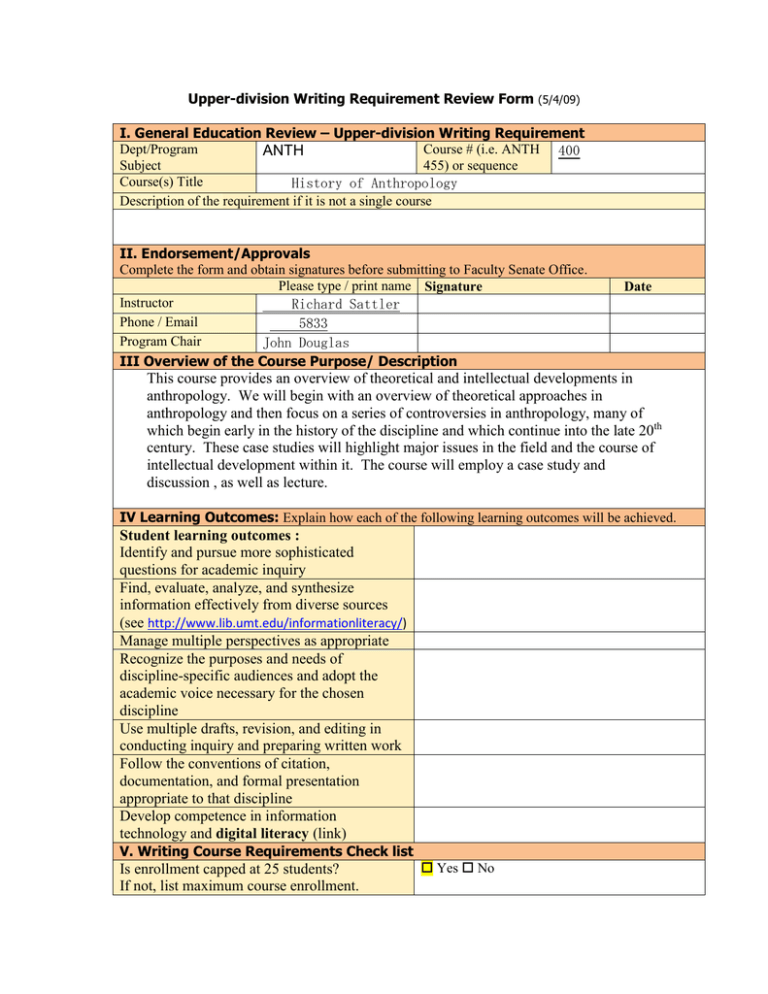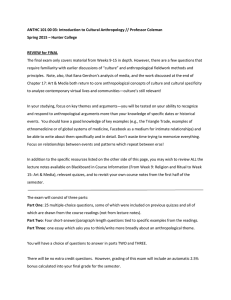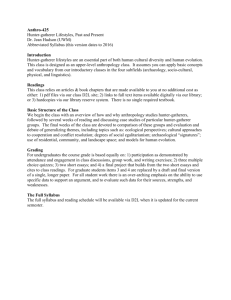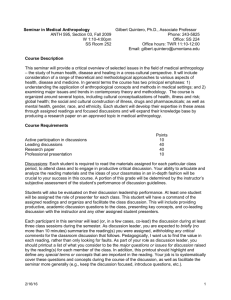Document 11903595
advertisement

Upper-division Writing Requirement Review Form (5/4/09) I. General Education Review – Upper-division Writing Requirement Dept/Program Course # (i.e. ANTH 400 ANTH Subject 455) or sequence Course(s) Title History of Anthropology Description of the requirement if it is not a single course II. Endorsement/Approvals Complete the form and obtain signatures before submitting to Faculty Senate Office. Please type / print name Signature Instructor Richard Sattler Phone / Email 5833 Program Chair John Douglas III Overview of the Course Purpose/ Description Date This course provides an overview of theoretical and intellectual developments in anthropology. We will begin with an overview of theoretical approaches in anthropology and then focus on a series of controversies in anthropology, many of which begin early in the history of the discipline and which continue into the late 20th century. These case studies will highlight major issues in the field and the course of intellectual development within it. The course will employ a case study and discussion , as well as lecture. IV Learning Outcomes: Explain how each of the following learning outcomes will be achieved. Student learning outcomes : Identify and pursue more sophisticated questions for academic inquiry Find, evaluate, analyze, and synthesize information effectively from diverse sources (see http://www.lib.umt.edu/informationliteracy/) Manage multiple perspectives as appropriate Recognize the purposes and needs of discipline-specific audiences and adopt the academic voice necessary for the chosen discipline Use multiple drafts, revision, and editing in conducting inquiry and preparing written work Follow the conventions of citation, documentation, and formal presentation appropriate to that discipline Develop competence in information technology and digital literacy (link) V. Writing Course Requirements Check list Is enrollment capped at 25 students? If not, list maximum course enrollment. Yes No Explain how outcomes will be adequately met for this number of students. Justify the request for variance. Are outcomes listed in the course syllabus? If not, how will students be informed of course expectations? Yes No This information is available in grading criteria for each assignment posted on Blackboard Are detailed requirements for all written Yes No assignments including criteria for evaluation in the This information is available in grading criteria course syllabus? If not how and when will students for each assignment posted on Blackboard be informed of written assignments? Please attach one example of instructions for written assignment. Briefly explain how students are provided with tools and strategies for effective writing and editing in the major. Which written assignments include revision in Research paper response to instructor’s feedback? Are expectations for Information Literacy listed in Yes No the course syllabus? If not, how will students be This information is available in grading criteria informed of course expectations? for each assignment posted on Blackboard VI. Writing Assignments: Please describe course assignments. Students should be required to individually compose at least 20 pages of writing for assessment. At least 50% of the course grade should be based on students’ performance on writing assignments. Clear expression, quality, and accuracy of content are considered an integral part of the grade on any writing assignment. Formal Graded Assignments None Informal Ungraded Assignments VII. Syllabus: Paste syllabus below or attach and send digital copy with form. The syllabus should clearly describe how the above criteria are satisfied. For assistance on syllabus preparation see: http://teaching.berkeley.edu/bgd/syllabus.html Paste syllabus here. ANTHROPOLOGY 400: HISTORY OF ANTHROPOLOGICAL THOUGHT T/R * 9:40am-11:00pm * Gallagher Business Building L04 FALL 2010 INSTRUCTOR: Richard A. Sattler OFFICE: SS 222 PHONE: 243-5833 HOURS: T/R 11:00-12:00am E-MAIL: richard.sattler@ umontana.edu W 1:00-2:00pm or by appointment COURSE DESCRIPTION OFFICE This course provides an overview of theoretical and intellectual developments in anthropology. We will begin with an overview of theoretical approaches in anthropology and then focus on a series of controversies in anthropology, many of which begin early in the history of the discipline and which continue into the late 20th century. These case studies will highlight major issues in the field and the course of intellectual development within it. The course will employ a case study and discussion , as well as lecture. COURSE OBJECTIVES 1. Students will gain knowledge of the history of anthropological theory and key concepts. 2. Students will acquire an understanding of critical issues in anthropology. 3. Students will increase their insights into the intellectual development of anthropology. 4. Students will improve their ability to analyze and resolve critical issues encountered in anthropological theory. COURSE REQUIREMENTS Course Evaluation: Presentations (Thursdays): All students will be divided into groups the first week of class. Beginning the fifth week of class, each group will give a series of presentations on particular controversies in anthropology and be prepared to lead a discussion on that controversy. Presentations are worth 30% of your grade. See “Guide to Oral Presentations” on Blackboard. Reading Journal: All students will post a weekly reading journal entry over that week’s assigned readings. These will be posted on Blackboard and are due on Wednesday of the week assigned at midnight. (Students have until Friday at midnight on the first week of class). Reading Journals are worth 10% of your grade. See “Guide to Reading Journals” on Blackboard. Case Analyses & Critique: Each student will prepare a 1-2 page summary of the controversy covered in the presentation and a critique of the presentation each week beginning with week 5. These will be posted on Blackboard and are due on the following Sunday at midnight. Case analyses are worth 10% of your grade. See “Guide to Case Analyses” on Blackboard. Discussion: This course is designed for students to engage and discuss theoretical issues in order to develop analytical and critical skills. Active participation by all students is required to achieve this goal. All students are expected to read all assigned materials and to be ready to discuss them in class. All students are also expected to contribute to the growth and development of other students through the fair and constructive discussion of their presentations. Discussion counts for 20% of your grade. See “Guide to Discussion” on Blackboard. Research Paper: Each student must write an original research paper on one or more anthropological approaches to one of the topics addressed in this class. You will need to outline the central assumptions and methods of analysis of the approach(es) analyzed, as well as list significant proponents of the approach(es) and their contributions to the analysis of the topic. You then need to critically evaluate the approach, its utility and contributions to anthropological understandings of the topic. Students may submit a draft for comments and revision prior to the Thanksgiving Holiday. The paper must be 10-15 pages long and use 10 scholarly sources other than those required in class and is due by Dec. 10. The research paper is worth 30% of your grade. See “Guide to Research Papers” on Blackboard. Attendance: Because this class is geared to discussion and participation, attendance at all classes is required. All absences, except those which are truly unavoidable, will result in the loss of points. If you are ill, have a work conflict, or experience a personal or family emergency, you must contact me before class to let me know that you will not be there. Academic Honesty: The University of Montana expects its students to be academically honest, particularly in regard to plagiarism. “Plagiarism is the representing of another’s work as one’s own.” Both copyright laws and University policies are rigid as concerns plagiarism. Consult the current “Student Conduct Code” for details regarding penalties for plagiarism. Students with Disabilities: If you need special accommodations, you should contact Disability Services for Students to make arrangements and let me know if there is anything I need to be aware of or that I need to do to assist you. Access: This syllabus, along with reading assignments, all guides, announcements, etc., will be available on-line through the university’s Blackboard system. Group Projects Group projects are designed to help you develop skills in teamwork, dispute resolution, and persuasion. Each group will need to meet outside of class to research, discuss, and analyze each controversy. I have set up group pages on the discussion board, as well as file share capabilities and group email for each of the group in Blackboard to facilitate this process. The group will need to research the topic, using at least six (6) sources other than those assigned in class, and may require the other students to read up to two additional articles (no more than 60 pages). Additional readings must be provided to the instructor in electronic format at least a week in advance. At the end of the semester, each student will submit an evaluation of the contributions of every member of their group. You cannot gain points by this, but points will be deducted if there are problems, such as members who consistently do not participate. See Guide to Oral Presentations on Blackboard for more information. Required Readings: Sidky, H. (2004) Perspectives on Culture: A Critical Introduction to Theory in Cultural Anthropology. Upper Saddle River, NJ: Prentice Hall. On-Line Readings (On Blackboard) PROVISIONAL COURSE OUTLINE WEEK 1 OVERVIEW: 19TH CENTURY READINGS: Sidky, Ch. 1-5 WEEK 2 OVERVIEW: 20TH CENTURY TO W II READINGS: Sidky, Ch. 6-9 WEEK 3 OVERVIEW: 20TH CENTURY SINCE WW II READINGS: Sidky, Ch. 10-14 WEEK 4 THEORY IN ARCHAEOLOGY, LINGUISTICS, & BIOLOGICAL ANTHROPOLOGY READINGS: W W Taylor, “An Analysis of Americanist Archeology in the United States;” J Lyons, “Linguistics: The Scientific Study of Language;” HussAshmore, “Theory in Human Biology: “Evolution, Ecology, and Variation.” WEEK 5 EVOLUTION EVOLVING READINGS: Campbell, “Conceptual Progress in Physical Anthropology: Fossil Man;” Spencer, “The Evolution of Society;” White, “Energy and the Evolution of Culture;” Steward, “Cultural Causality and Law;” Thieme, “The Comparative Method for Reconstruction in Linguistics.” Presentation (Thu): Biological vs. Cultural Evolution” WEEK 6 THE CULTURE CONCEPT READINGS: Keesing, “Theories of Culture;” Geertz, “The Impact of the Concept of Culture;” Roseberry, “Marxism and Culture;” Fox, “The Cultural Animal.” Presentation (Thu): Culture as Behavior vs. Culture as Ideas WEEK 7 IT’S ALL RELATIVE: KINSHIP & Descent READINGS: Holy, “Kinship Groups;” Fox, “Primate Kin and Human Kinship;” Wallace & Atckins, “The Meaning of Kinship Terms;” Schneider and Homans, “Kinship Terminology and the American Kinship System;” Levi-Strauss, “The Future of Kinship Studies;” Keesing, “Evolution and Adaptation in Social Structure.” Presentation (Thu): Descent Theory vs. Alliance Theory WEEK 8 IN GOD(S) WE TRUST?: RELIGION READINGS: Geertz, “Religion as a Cultural System;” Harris, “Why We Became Religious and the Evolution of the Spirit World;” Malefijt, “The Science of Religion;” Malefijt, “Twentieth Century Theories of Religion.” Presentation (Thu): Function vs. Meaning in Religion WEEK 9 OF CABBAGES AND KINGS: POLITICS READINGS: Kurtz, “The Structural-Funtional Paradigm;” Kurtz, “The Processual Paradigm;” Kurtz, “The Paradigm of Political Economy;” Kurtz, “The Paradigm” of Political Evolution: The Evolution of Politics.” Presentation (Thu): Why does Political Inequality Appear? WEEK 10 SHOW ME THE MONEY: ECONOMICS & SUBSISTENCE READINGS: Hatch “The Growth of Economic, Subsistence, and Ecological Studies in American Anthropology;” Roseberry, “Political Economy;” Smith, “The Archaeology of Ancient State Economies;” Plattner, “Introduction.” Presentation (Thu): Substantivists vs. Formalists WEEK 11 ALL MEN ARE CREATED EQUAL?: SOCIAL INEQUALITY READINGS: Radcliffe-Brown, “The Zande State;” Fried, “On the Evolution of Social Stratification and the State;” Carneiro, “A Theory of the Origin of the State;” Wolf, “The Mills of Inequality” Ruyle, “Slavery, Surplus and Stratification on the Northwest Coast;” Salzman, “Is Inequality Universal?” Presentation (Thu): Functionalism vs. Conflict Theory WEEK 12 SUGAR & SPICE?: GENDER READINGS: Evans-Pritchard, “The Position of Women in Primitive Societies and Our Own;” Rosaldo, “Woman, Culture, and Society;” Di Leonardo, “Introduction;” Schlegel, “Gender Meanings.” Presentation (Thu): Is Gender Inequality Universal? WEEK 13 RACE, ETHNICITY, & VARIATION READINGS: Roberts and Bear, “Studies of Modern Man;” Wade, “Defining Race;” Wade, “Existing Approaches to Race;” Spencer, “Theories of Race and Ethnicity.” Nov 25 (Tue) Term Paper Draft for Revision Due Nov 26-30 THANKSGIVING HOLIDAY WEEK 14 RACE, ETHNICITY, & VARIATION READINGS: Roberts and Bear, “Studies of Modern Man;” Wade, “Defining Race;” Wade, “Existing Approaches to Race;” Spencer, “Theories of Race and Ethnicity.” Presentation (Tue): Ethnicity: Cultural Anthropological Approaches to Human Diversity Presentation (Thu): Race: Bioanthropological Approaches to Human Diversity WEEK 15 APPLYING ANTHROPOLOGY READINGS: Little, “Anthropology and Development;” Whiteford and Bennett, “Applied Anthropology and Health and Medicine;” Baba, “Anthropological Practice in Business and Industry;” Greenman, “Anthropology Applied to Education.” Presentations (Thu): Ethical Considerations of Applied Work Dec 10 (Thu) Term Paper Due




